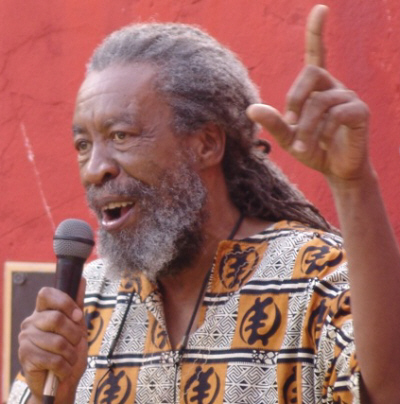
The program, organized by the cultural and historical organization Yesterday, Today and Tomorrow, was held Friday afternoon in Fort Frederik.
The first speaker, Carlyle Corbin, a former Virgin Islands official who is now an international advisor on democratic governance for the United Nations, looked to the future, saying that the current status of the U.S. Virgin Islands as an unincorporated possession of the United States was never intended to be permanent.
The U.S.V.I. is one of 16 such unincorporated areas identified by the United Nations, which for decades has been trying to move those territories into full, self-determining, democratic polities.
There are three courses the V.I. can take, Corbin said: integration, in which the territory becomes a state or is incorporated into another state, either one of the existing 50 or a new state; independence, in which the territory becomes an independent nation; or free association, in which the territory becomes a sovereign state associated with another country, most likely but not necessarily the United States.
There are advantages and disadvantages to any option, Corbin said, but he leans towards free association as both an achievable and appropriate goal.
Under the islands’ current status, residents are U.S. citizens, but are not allowed to vote in presidential elections nor are they represented by a voting member of Congress.
There are many small Caribbean islands that are independent nations, and Corbin said they’re mostly doing fine. But "independence is a state of mind," he said, and Virgin Islanders don’t seem to be in that state yet.
As a free association territory, the Virgin Islands would be autonomous, making its own internal laws, running its own affairs, but associated with another country for political, economic and social stability.
Reviewing the history of constitutional conventions in the V.I., Corbin said it would have been wiser to establish status first, then adopt a constitution based on that status, rather than the other way around.
While Corbin looked to the future, the second speaker fixed his gaze on the past and told the story of emancipation with vigor, humor, scorn and hope.
Activist, historian and author Mario C. Moorhead took the audience back to 1807, when the Napoleonic wars raged across Europe. Denmark made the mistake of aligning itself with the French emperor. England captured the entire Danish navy and conquered the Virgin Islands. Without the income from its sugar plantations, Denmark soon went bankrupt.
The islands were eventually returned to Denmark, which geared up sugar production to regain prosperity. But England found a cheaper source of sugar in India. No longer having a financial benefit from slavery, England freed its slaves. This dealt a double blow to Denmark, dropping the price of sugar and creating increased tension in the slave community.
Moorhead heaped scorn on Gov. Peter Von Scholten, the governor-general of the territory who is often portrayed as the open-minded father of emancipation.
"He was an arrogant man, an ostentatious man, a man who felt that the world owed him something," Moorhead said.
At one point Von Scholten traveled to France and met with King Louis Phillippe I, trying to convince the monarch not to abolish slavery in his territory. Von Scholten is also often smiled on by history for requiring that the children of slaves attend school, but these were not schools that taught reading, writing, counting or anything that would enable the young slaves to better themselves. They were schools that taught obedience.
As new shocks hit the Caribbean, the slaves under the leadership of the legendary figure of Buddhoe began fomenting for freedom.
While history often tells the story of the poor slaves who were granted freedom by the beneficent Danes, Moorhead said it was the slaves who forced the issue, marching on Fort Frederik after first taking al the gunpowder from the fort and replacing it with barrels of sand, then facing down the governor and his soldiers and forcing him to declare emancipation.
The audience of more than 200 laughed and cheered as Moorhead related his story.
The ancestors of those slaves who seized their freedom have nothing to be ashamed of today, he said.





